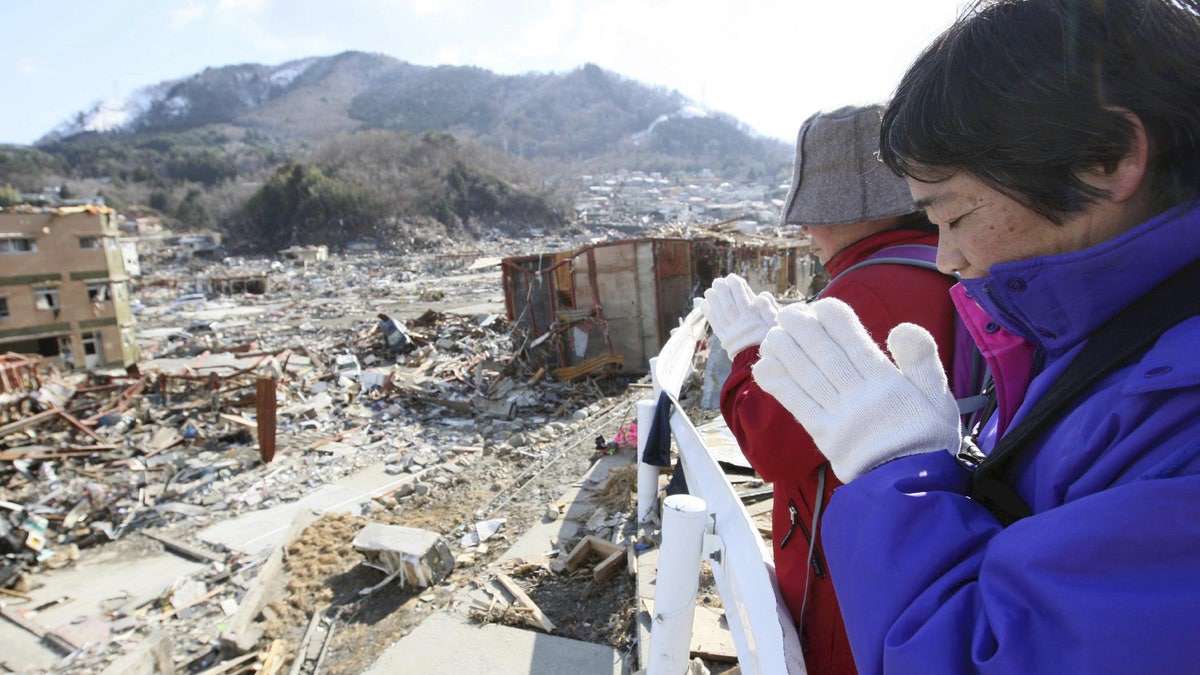
Survivors press their hands together in prayer to mourn their relatives at the devastated town of Onagawa, northeastern Japan, on Friday, March 18, 2011, just one week after a massive earthquake and resulting tsunami.
After the attacks of Sept. 11, houses of worship across America threw open their doors to those seeking comfort in faith. But what of Japan, a country where many consider themselves more secular than sacred? Where do they turn for comfort from the triple threat of earthquake, tsunami and potential nuclear catastrophe?
First, it may be deceptive to think of Japan as non-religious, says Dr. Michael Roemer, assistant professor of Religious Studies at Ball State University in Indiana. "In Japan, they don't belong to [congregational] religious organizations like in the U.S. like Churches, Mosques, or Temples." But there is still faith.
Another American academic, Dr. Duncan Williams of the University of California at Berkeley, was in Japan on a train headed to Tokyo’s airport when the quake hit. His train nearly derailed, and was so damaged it had to be evacuated.
"I think many people were praying, very much, for the well-being of their loved ones who they weren't able to contact," he said.
During a speech to his nation, Japanese Emperor Akihito also told the people he was praying. But to whom, or what?
While faith isn’t necessarily front and center in every aspect of Japanese life, there are ancient religious influences entwined in the culture. For example, the traditions of Buddhism and Shintoism still run strong, despite some 70 percent of Japanese saying they have no personal god.
"Certainly, in moments of crisis at the time of death, at moments of illness and so on, people do tend to their faith tradition," said Williams. Some Japanese will pray to either Buddha or Shinto deities, and ask for the safety of those who are missing. Mantras or prayers will be recited, especially in the coastal regions of Japan in fishing villages near the epicenter of the quake.
Rev. Hoshu Y. Matsubayashi, of the New York Buddhist Church, laments that many modern Japanese have forgotten to live according to the Buddhist traditions of their country - a faith he said would help them put natural disasters like quakes in perspective.
"Human beings exist as part of the entire universe, and we have to respect all the natures," said Matsubayashi, who was raised in Japan. "Everything is constantly changing. Everything doesn't go the way we want, and everything is interdependent existent."
Trying to find a theological framework for the disaster found one Japanese politician in a bit of trouble. On Monday, Tokyo Gov. Shintaro Ichihara called the disaster "Tembatsu (divine punishment)." He later apologized.
Duncan predicted many Japanese will, in the coming weeks or months, ponder these deeper questions: “Like, 'how is it possible this kind of massive tragedy has befallen not only me, my family my community, and my country?’"
"These kinds of meaning of causes and conditions " he said, "is something which in Buddhism is called Karma - trying to find some karmic reason for why this event occurred." But for now, Duncan said he sees a different kind of faith in the Japanese people’s reaction to their national tragedy.
"People’s ability to stoically face this difficult situation, to give some priority to seniors, to the young, to act together as community in compassion ... that's the real meaning of religious response in Japan today."
